#umar nadeem
Text




humraaz: eman suleman and sauban umais for zara shahjahan bride, ph. umar nadeem
467 notes
·
View notes
Text






Mehndi by sereneshahdab for Hussain Rehar Pakistan ph. by Umar Nadeem
#sereneshahdab#umar nadeem#hussain rehar#lahore#pakistan#fashion photography#fashion#mehndi#henna#henna art#photography#my upload
37 notes
·
View notes
Text





Designer: Hussain Rehar Model: Eman Suleman Makeup Artist: Saima Bagfrede Photographer: Umar Nadeem Jewels: Farhat Ali Jewelry Styling: Yash
#pakistani couture#fashion#photography#beauty#art#southasiansource#desi fashion#pakistani fashion#pakistan#desi#desiblr#desi tumblr#eman suleman#hussain rehar
19 notes
·
View notes
Text









summer is upon us. moya mawhinney (1, 4), iam_hyun on ig (3, 6), umar nadeem (5), miss_nylong on ig (7) hitomi mochizuki (8), peder mork (9)
#moodboard#aes#aesthetic#cottagecore#naturecore#grandmacore#lovecore#goblincore#cozy#cozycore#peoplehood#tender#indie#art#vintage#light academia#academia#photography#mb#summer#architecture#romanticism#desi#desicore#salmamoodboards
144 notes
·
View notes
Text
Battle of Imam Hussain (as)
When Nadeem Sarwar wrote this in one of the latmiyah (noha) lyrics he wasn't wrong:
Bolay Ali (as) Hussain (as) ho ab bhi hawas main?
Aesi TU Jang hum na laray bhook o piyas main
(ALI (as) asked Hussain (as) it is remarkable that after all you have been through you are still fighting the oppressors with such vigour and strength albeit being thirsty and hungry for three days - that is how come weakness has not yet over powered you!)

Maqtal writes about the battle Imam Hussain (as) made and what is surprising is that many yazidi historians also write about Imam Hussain (as) final battle on Ashura! Words may not have enough potential to describe his fence and defense. Only perhaps to explain some gist in broken way is that Imam Hussain (as) loved Allah, Allah's Prophet (saww), Allah's religion, and Allah's Wali (as) so much that albeit the extent of adversity that one person could go through and a never ending array of heinous acts by the yazidis that could shatter one person mentally, emotionally, physically, and spiritually, Imam Hussain (as) remained ever more affirm on his stance. Therefore, when he arrived in the battlefield and when he saw that only defense and fence is left he made his advance. His first advance shattered the central command of yaidis and disrupted their entire alignment so much that some ran to escape and hit the gates of the adjoining city Koofa! To capture this maqtal writes,
"The yazidis flee as if the grass hoppers skipping here and there aimlessly!"
Maqtal also writes that there are moments in Ashura when Imam Hussain (as) during his battle halted his advance and he alone was in the battle field because the yazidis were so afraid that they could dare not approach. While Imam Hussoan (as) halted maqtal says he was speaking to Allah (swt), the raaz o niaz. Meanwhile Umar IBN e Saad used to increase promises of bounties so his puppet, soul less army started to attack again, and this went on for a while.
Maqtal also says that one of the beauty of Imam Hussain (as) attacks was his devotion to Allah and the way he was remembering his Lord so he reiterated,
"By Allah, for Allah, no strength except Allah"
The skies had no Hijab that day therefore the Lord of Universes Himself witnessed Hussain (as) revert back lacs of army that stood against Allah's Deen and his Prophet (saww)! Therefore, Allah (swt) also sent His praise to Imam Ali (as) and Bibi Sayeda (sa) again on Ashura and He spoke to the angels who had formerly asked Allah (swt) to topple the Earth like He (swt) had done before when transgressors exceeded their limits and spread fitna and oppression. So Allah (swt) spoke,
"Praise on Hussain (as) and my salutations on Hussain (as) and his ancestors for verily they are the ones fulfilling their promise and I shall also render my promise to them!"
And then when it was time to deliver the promise by Mola Hussain (as) and the world was no longer suitable to be an abode for such a magnificent and loved soul, Allah (swt) spoke again:
“O tranquil soul!
Return to your Lord, well pleased ˹with Him˺ and well pleasing ˹to Him˺.
So join My servants,
and enter My Paradise.” (Surah Fajar 27 to 30)
Imam Hussain (as) when he heard that the Lord (swt) himself awaits his return, he ceased his sword.
Ibrahim (as) when he was being oppressed by Namrood and when he was asked what he thought about burning in the fire and dying he said, "Why delay meeting a dear friend (Allah)?"
Imam Hussain (as) was from Khalil ullah Hazrat Ibrahim's (as) generation and he remained affirm on the words of Khalil ullah (as) therefore, he responded to Allah's call in the following words while ceasing his attacks immediately and foregoing his sword,
"To Allah (swt) we belong and to Him (swt) we return."
And that was that. Yazidis slowly started overpowering Imam Hussain (as) until the point he was made a seive of wounds with blood oozing out of him and no form of attack remained that his soul did not receive. Stones, dust, rocks, spears, lances, swords, bludgeon and what not? And what is ahead is the worst of worst in the chequered past of so called Muslim history which… is the masaib of shahadat.
#islam#karbala#islamic#imam hussain#shia#muharram#martyrdom epic#heroes of karbala#martyrdom#thoughts#hazrat imam hussain (as)#imam husayn#i write maqtal#maqtal
4 notes
·
View notes
Text
داور حشر مجھے تیری قسم
عمر بھر میں نے عبادت کی ہے
تو مرا نامۂ اعمال تو دیکھ
میں نے انساں سے محبت کی ہے
Dawar-e-hashr mujhe teri qasam
Umar bhar mein ne ibaadat ki hai
Tu mera naama-e-amaal to dekh
Mein ne insaan se muhabbat ki hai
–Ahmed Nadeem Qasmi
O Judge of the Doomsday! I swear on you!
I have prayed my whole life
Do look upon my 'list of actions'
I have loved humans!
#ahmed nadeem qasmi#literature#urdu#urdu poems#urdu poetry#shayari#poetry#beautiful quote#idk much abt translation but i did what i did#poets on tumblr#urdu shairi
13 notes
·
View notes
Text
Exclusive: Imran Khan on His Plan to Return to Power
— By Charlie Campbell | April 3, 2023 | Time Magazine
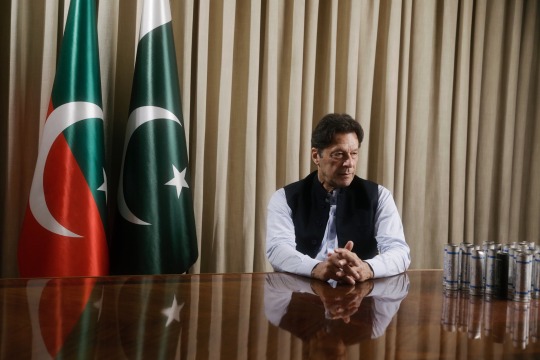
Former Pakistan Prime Minister Imran Khan sits for a portrait in his Lahore residence on March 28. Next to Khan are tear gas canisters he says were thrown at his house. Umar Nadeem for Time Magazine
Political leaders often boast of inner steel. Imran Khan can point to three bullets dug out of his right leg. It was in November that a lone gunman opened fire on Khan during a rally, wounding the 70-year-old as well as several supporters, one fatally. “One bullet damaged a nerve so my foot is still recovering,” says the former Pakistani Prime Minister and onetime cricket icon. “I have a problem walking for too long.”
If the wound has slowed Khan, he doesn’t show it in a late-March Zoom interview. There is the same bushy mane, the easy laugh, prayer beads wrapped nonchalantly around his left wrist. But in the five years since our last conversation, something has changed. Power—or perhaps its forfeiture—has left its imprint. Following his ouster in a parliamentary no-confidence vote in April 2022, Khan has mobilized his diehard support base in a “jihad,” as he puts it, to demand snap elections, claiming he was unfairly toppled by a U.S.-sponsored plot. (The State Department has denied the allegations.)
The actual intrigue is purely Pakistani. Khan lost the backing of the country’s all-powerful military after he refused to endorse its choice to lead Pakistan’s intelligence services, known as ISI, because of his close relationship with the incumbent. When Khan belatedly greenlighted the new chief, the opposition sensed weakness and pounced with the no-confidence vote. Khan then took his outrage to the streets, with rallies crisscrossing the nation for months.
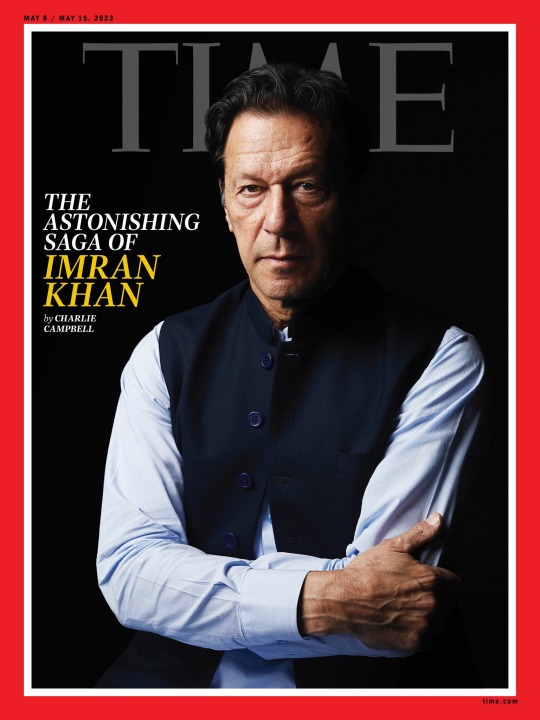
Photograph by Umar Nadeem for Time Magazine
“Imran Khan can communicate with all strata of society on their level,” says Shaheena Bhatti, 63, a professor of literature in Rawalpindi. “The other politicians are … not going to do anything for the country because they’re only in it for themselves.”
The November attack on Khan’s life only intensified the burning sense of injustice in members of his Pakistan Tehreek-e-Insaf party, or PTI, who have since clashed with police in escalating street battles involving slingshots and tear gas. Although an avowed religious fanatic was arrested for the shooting, Khan continues to accuse an assortment of rival politicians of pulling the strings: incumbent Prime Minister Shehbaz Sharif—brother of Khan’s longtime nemesis, former Prime Minister Nawaz Sharif—as well as Interior Minister Rana Sanaullah and Major General Faisal Naseer. (All have denied the accusation.)
In addition to bullets, Khan has also been hit by charges—143 over the past 11 months, by his count, including corruption, sedition, blasphemy, and terrorism—which he claims have been concocted in an attempt to disqualify him from politics. After Sharif’s cabinet declared on March 20 that the PTI was “a gang of militants” whose “enmity against the state” could not be tolerated, police arrested hundreds of Khan supporters in raids.
“Either Imran Khan exists or we do,” Interior Minister Sanaullah said on March 26.
Pakistan sometimes seems to reside on a precipice. Its current political instability comes amid devastating floods, runaway inflation, and resurgent cross-border terrorist attacks from neighboring Afghanistan that together threaten the fabric of the nation of 230 million. It’s a country where rape and corruption are rife, and the economy hinges on unlocking a stalled IMF bailout, Pakistan’s 22nd since independence in 1947. Inflation soared in March to 47% year-over-year; the prices of staples such as onions rose by 228%, wheat by 120%, and cooking gas by 108%. Over the same period, the rupee has plummeted by 54%.
“Ten years ago, I earned 10,000 rupees a month [$100] and I wasn’t distressed,” says Muhammad Ghazanfer, a groundsman and gardener in Rawalpindi. “With this present wave of inflation, even though I now earn 25,000 [$90 today] I can’t make ends meet.” The world’s fifth most populous country has only $4.6 billion in foreign reserves—$20 per citizen. “If they default, and they can’t get oil, companies go bust, and people don’t have jobs, you would say this is a country ripe for a Bolshevik revolution,” says Cameron Munter, a former U.S. ambassador to Pakistan.
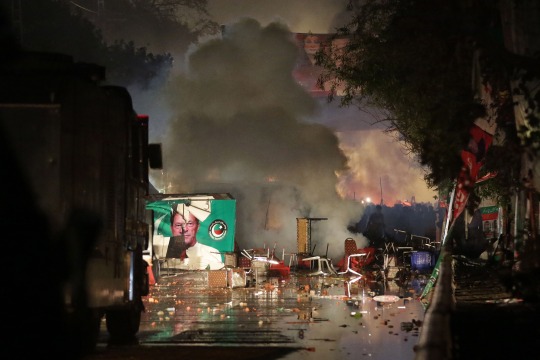
Police fired teargas to disperse the supporters of the former Prime Minister as they tried to arrest Khan in Lahore, Pakistan, on March 14. Hundreds of Tehrik-e-Insaf supporters clashed with riot police as they reached Khan's residence. Rahat Dar—EPA-EFE/Shutterstock
“Our economy has gone into a tailspin,” says Khan. “We now have the worst economic indicators in our history.” The situation threatens to send the nuclear-armed country deeper into China’s orbit. Yet sympathy is slim in a West put off by Khan’s years of anti-American bluster and cozying up to autocrats and extremists, including the Taliban. He calls autocratic Turkish President Recep Tayyip Erdogan “my brother” and visited Russian President Vladimir Putin in Moscow on the eve of the Ukraine invasion, remarking on “so much excitement.” Khan can both repeatedly declare Osama bin Laden a “martyr” and praise Beijing’s confinement of China’s Uighur Muslim minority. He has obsessed on Joe Biden’s failure to call him after entering the White House. “He’s someone that is imbued with this incredibly strong sense of grievance,” says Michael Kugelman, the deputy director of the Asia Program at the Woodrow Wilson Center.
Yet Khan can legitimately claim to have democracy on his side, with poll numbers suggesting he is a shoo-in to return to power if the elections he demands happen. “His popularity has skyrocketed,” says Samina Yasmeen, director of the Centre for Muslim States and Societies at the University of Western Australia. “No matter what he says, even if it’s irrational, the reality is that people are angry and taken by his message.”
“Imran Khan is the best bet we have right now,” says Osama Rehman, 50, a telecommunications engineer in Islamabad. “If [he] is arrested or disqualified, people will come out onto the street.”
The state appears to flirt with the idea. Police raids on Khan’s home in the Punjab province capital of Lahore in early March left him choking on tear gas, he says, as supporters brandishing sticks battled police in riot gear before makeshift barricades of sandbags and iron rods. “This sort of crackdown has never taken place in Pakistan,” says Khan. “I don’t know even if it was as bad under martial law.”
After Khan left his compound to appear in court on March 18, traveling in an armored SUV strewn with flower petals and flanked by bodyguards, the police swooped in while his wife was home, he says, beating up servants and hauling the family cook off to jail. He claims another assassination attempt awaited inside the Islamabad Judicial Complex, which was “taken over by the intelligence agencies and paramilitary.”
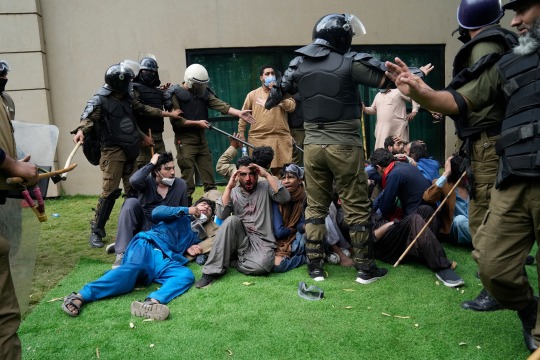
Police arrested 61 supporters of former Prime Minister Imran Khan during a search operation near Khan’s residence, in Lahore, Pakistan, on March 18, 2023. K.M. Chaudary—AP
The confrontation could remain in the streets indefinitely. Prime Minister Sharif has rejected Khan’s demand for a snap election, saying polls would be held as scheduled in the fall. But “every narrative is being built up [for the government] to justify postponing the elections,” says Yasmeen. On March 22, Pakistan’s Election Commission delayed local balloting in Punjab, the country’s most populous province, from April 30 until Oct. 8.
“Political stability in Pakistan comes through elections,” Khan points out. “That is the starting point for economic recovery.” From the U.S. perspective, he may be far from the ideal choice to helm an impoverished, insurgency-racked Islamic state. But is he the only person that can hold the country together?
“Never has one man scared the establishment … as much as right now,” says Khan. “They worry about how to keep me out; the people how to get me back in.”
It’s indicative of Pakistan’s malaise that its most popular politician in decades sits barricaded at home. But the nation has always been beyond comparison—a wedge of South Asia that begins in the shimmering Arabian Gulf and ascends to its Himalayan heights. It’s the world’s largest Islamic state, though governed for half its history by men in olive-green uniforms, who continue to act as ultimate arbiters of power.
The only boy of five children, Khan was born Oct. 5, 1952 to an affluent Pashtun family in Lahore. He studied politics, philosophy, and economics at Oxford University, and it was in the U.K. that he first played cricket for Pakistan, at age 18. Britain’s sodden terrain also provided the backdrop to his political awakening.
“When I arrived in England our country had been ruled by a military dictator for 10 years; the powerful had one law, the others were basically not free human beings,” he says. “Rule of law actually liberates human beings, liberates potential. This was what I discovered.”
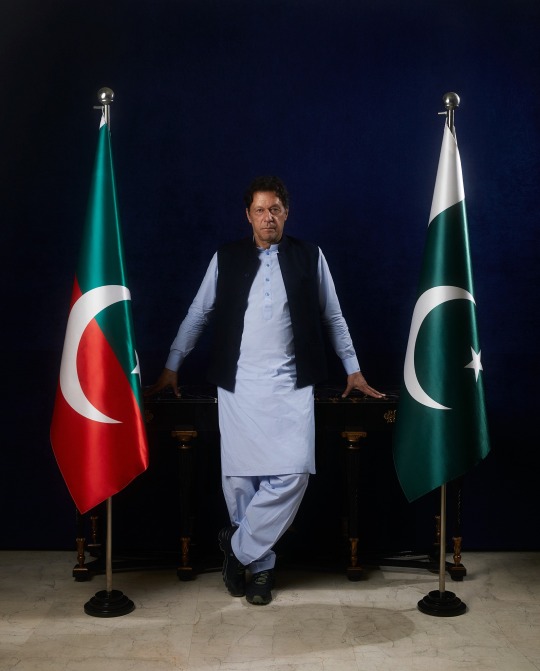
Khan in his Lahore residence on March 28. Umar Nadeem for Time Magazine
On the cricket pitch, Khan was a talisman who knitted together mercurial talents and journeymen into a cohesive whole, a team that overcame extraordinary odds to famously lift the Cricket World Cup in 1992. There were glimpses of these qualities when Khan rose to become Prime Minister: running on an anti-graft ticket, he fused a disparate band of students and workers, Islamic hard-liners, and the nation’s powerful military to derail the Sharif political juggernaut. His crowning achievement remains the Shaukat Khanum Cancer Hospital in Lahore, which he opened in 1994 in memory of his mother, who succumbed to the disease. It is the largest cancer hospital serving Pakistan’s impoverished, boosting Khan’s administrative credentials.
Khan spent 22 years in the political wilderness before his 2018 election triumph. But once in power, the self-styled bold reformer turned unnervingly divisive. Opposition is easier than government, and Khan found himself bereft of ideas and besieged by unsavory partners, even kowtowing to the now-banned far-right party Tehreek-e-Labbaik Pakistan despite its support for the extrajudicial killing of alleged blasphemers. There were some successes: Pakistan received praise for its handling of the pandemic, with deaths per capita just a third that of neighboring India. His “Ten Billion Tree Tsunami” reforestation drive was popular, as was the 2019 return of international test cricket, the most prestigious form of the game, following a terrorist attack on the Sri Lankan team and a decade-long hiatus.
Khan’s private life has rarely been out of the headlines. His first wife was British journalist and society heiress Jemima Khan, née Goldsmith, a close friend of Diana, Princess of Wales. She converted to Islam for their wedding, though the pair divorced in 2004 after nine years of marriage, and her family’s Jewish heritage was political dynamite. (The couple’s two sons live in London.) Khan’s second marriage to British-Pakistani journalist Reham Khan lasted nine months. According to a 1997 California court ruling, Khan also has one child, a daughter, born out of wedlock, and he’s struggled to quash gossip of several more. In 2018, six months before he took office, he married his current wife, Bushra Bibi Khan, a religious conservative who is believed to be the only Pakistan First Lady to wear the full-face niqab shawl in public.
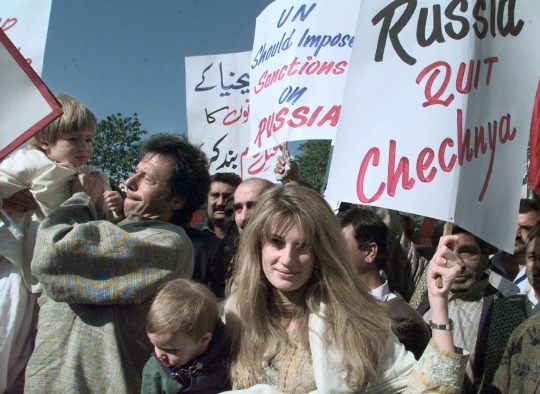
Khan, left, lifts elder son Suleman while his ex-wife Jemima carries younger son Qasim during a march towards the U.N. offices in Islamabad in 1999. The Khans led some 100 demonstrators in an anti-Russian rally protesting against attacks in Chechnya. Reuters
It all fed Khan’s legend: the debonair playboy who grew devout; the privileged son who rails against the corrupt; the humanist who stands with the bloodthirsty. His youth was spent carousing with supermodels in London’s trendiest nightspots. But his politics has hardened as his handsome features have lined and leathered. He provoked outrage when in August 2021 he said the Taliban had “broken the shackles of slavery” by taking back power (he insists to TIME he was “taken out of context”) and has made various comments criticized as misogynistic. When asked about the drivers of sexual violence in Pakistan, he said, “If a woman is wearing very few clothes, it will have an impact on the men, unless they’re robots.” Khan has refused to condemn Putin’s invasion, insisting, like China, on remaining “neutral” and deflecting uncomfortable questions onto supposed double standards regarding India’s inroads into disputed Kashmir. “Morality in foreign policy is reserved for powerful countries,” he says with a shrug.

Khan in the 1992 Cricket World Cup. Pakistan won under Khan's captaincy this year. Fairfax Media
At the same time, Khan’s ideological flexibility has not stretched to compromises with opponents. He claims it was the military’s unwillingness to go after Pakistan’s influential “two families”—those of Sharif and the Bhutto clan of former Prime Ministers Zulfikar and Benazir—for alleged corruption that caused his relationship with the generals to fray. “If the ruling elite plunders your country and siphons off money, and you cannot hold them accountable, then that means there is no rule of law,” he says.
Yet analysts say that it was Khan’s relentless taunting of the U.S. that torpedoed his relationship with the military, which remains much more interested in retaining good relations with Washington. To journalists and supporters, he has accused the U.S. of imposing a “master-slave” relationship on Pakistan and of using it like “tissue paper.” To TIME, he insists that “criticizing U.S. foreign policy does not make you anti-American.” Still, by 2022, the generals no longer had his back. The common perception among Pakistan watchers is that Khan’s fleeting political success was owed to a Faustian pact with the nation’s military and extremist groups that shepherded his election victory and he is now reaping the whirlwind.
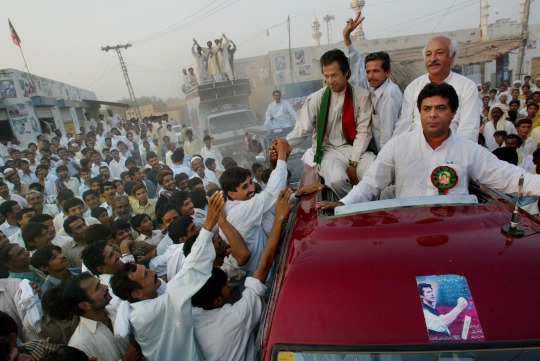
Cricket captain turned politician Imran Khan shakes hands with supporters during a rally in October 2002 in Shadi Khal, Pakistan. Paula Bronstein—Getty Images
He appears to relish in the perceived injustice, the walls closing in. On March 25, Khan addressed thousands of supporters in central Lahore from a bulletproof box above a green-and-red flag with the initials of his PTI emblazoned on a cricket bat—once Khan’s weapon of choice, though now he wields words with similar potency.
“I know you have decided you wouldn’t allow Imran Khan back in power,” he said. “That’s fine with me. But do you have a plan or know how to get the country out of the current crisis?”
If Pakistan’s economic woes are reaching a new nadir, the trajectory was established during Khan’s term. A revolving door of Finance Ministers was compounded by bowing to hardliners. (After appointing renowned Princeton economist Atif Mian as an adviser, Khan fired him just days later owing to a backlash from Islamists because Mian is an Ahmadi, a sect of Islam they consider heretics.) In 2018, Khan pledged not to follow previous administrations’ “begging bowl” tactics of foreign borrowing, in order to end Pakistan’s cycle of debt. But less than a year later, he struck a deal with the IMF to cut social and development spending while raising taxes in exchange for a $6 billion loan. Mismanagement exacerbated global headwinds from the pandemic and soaring oil prices.
Meanwhile, little was done to address Pakistan’s fundamental structural issues: few people pay tax, least of all the feudal landowners who control traditional low-added-value industries like sugar farms, textile mills, and agricultural interests while wielding huge political-patronage networks stemming from their workers’ votes. In 2021, only 2.5 million Pakistanis filed tax returns—less than 1% of the adult population. “People don’t pay tax, especially the rich elite,” says Khan. “They just siphon out money and launder it abroad.”
Instead, Pakistan has relied on foreign money to balance a budget and provide government services. The U.S. funneled nearly $78.3 billion to Pakistan from 1948 to 2016. But in 2018, President Trump ended the $300 million security assistance that the U.S. provided annually. Now Pakistan must shop around for new benefactors—chiefly Saudi Arabia, Russia, and China. When Khan visited Putin last February, it was to arrange cheap oil and wheat imports and discuss the $2.5 billion Pakistan Stream gas pipeline, which Moscow wants to build between Karachi and Kasur. More recently, China has stepped in. In early March, the Industrial and Commercial Bank of China approved a $1.3 billion loan rollover—a fiscal bandaid for a gaping wound.
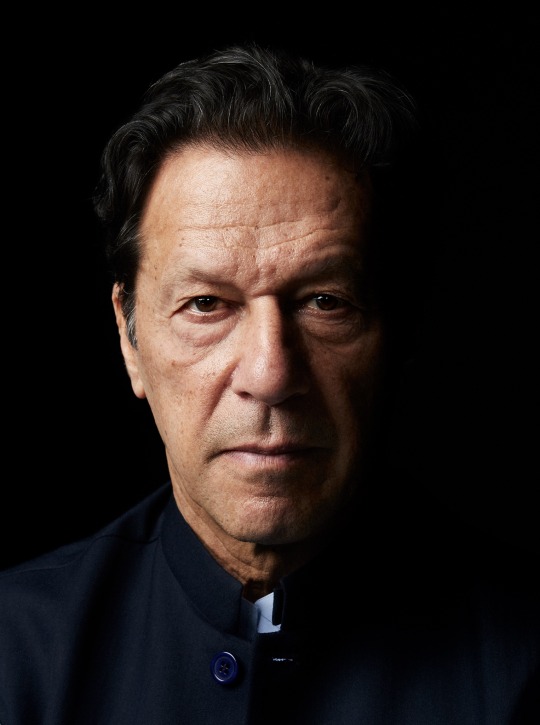
Khan in his Lahore residence on March 28. Umar Nadeem for Time Magazine
But if Khan recognized the problem, he did little to solve it. After his election in 2018, he was in an uncommonly strong position with the backing of the military and progressives, as well as the tolerance of the Islamists. Now, with all the bad blood and open warfare among these factions, even if he claws his way back, “he’ll be in a weaker position to actually effect any reforms,” says Munter, the former U.S. ambassador, “if he had any reforms to begin with.”
When asked for his step-by-step plan to get Pakistan back on track, Khan is light on details. After elections, he says that a “completely new social contract” is required to enshrine power in political institutions, rather than the military. If the army chief “didn’t think corruption was that big a deal, then nothing happened,” Khan complains. “I was helpless.” But the path to this utopia remains murky. Asked how he plans to turn his much trumpeted Islamic Welfare State ideal into a reality, Khan talks about Medina under the Prophet and the social conscience of Northern Europeans. “Scandinavia is probably far closer to the Islamic ideal than any of the Muslim countries.”
But the military looms large in Pakistan partly because national security is a perennial issue. Many assumed that the newly returned Taliban would stamp out all cross-border attacks from Afghanistan. But Pakistan recorded the second largest increase in terrorism-related deaths worldwide in 2022, up 120% year-over-year. “It was Khan who was pushing for talks with [the Taliban] at all costs,” says Kugelman, of the Woodrow Wilson Center. “That embrace is now experiencing significant levels of blowback.”
That Pakistan is moving away from the U.S. and closer to Russia and China is a moot point; the bigger question is who actually wins from embracing Pakistan. The $65 billion China-Pakistan Economic Corridor was supposed to be the crown jewel in President Xi Jinping’s signature Belt and Road Initiative, linking China via roads, rail and pipeline to the Arabian Sea. But Gwadar Port is rusting and suicide bombers are taking aim at buses filled with Chinese workers. Loans are more regularly defaulted than paid. Today, even Iran looks like a more stable partner.
Ultimately, competition with Beijing defines American foreign policy today, meaning Washington prioritizes relations with Pakistan’s archnemesis India, which is a key partner in the Biden Administration’s Indo-Pacific Strategy to contain China. Toward that imperative, the White House turns a blind eye even to New Delhi’s continued close relationship with Putin. The U.S. kinship with India may mean Pakistan was always destined to move closer to China. But after the U.S. pulled out of Afghanistan, Pakistan is not the strategic lynchpin it once claimed to be—and memories are hardly fond; Pakistan secretly invested heavily in the Taliban. “Lots of Americans in Washington say we lost the war in Afghanistan because the Pakistanis stabbed us in the back,” says Munter.
What happens next? Many in Khan’s PTI suspect the current government may declare their party a terrorist organization or otherwise ban it from politics. Others believe that Pakistan’s escalating economic, political, and security turmoil may be used as grounds to postpone October’s general election. Ultimately, all sides are using the tools at their disposal to prevent their own demise: Khan wields popular protest and the banner of democracy; the government has the courts and security apparatus. Caught between the two, the people flounder. “There are no heroes here,” says Kugelman. “The entire political class and the military are to blame for the very troubled state the country finds itself in now.”
It’s a crisis that Khan still claims can be solved by elections, despite his broken relationship with the military. “The same people who tried to kill me are still sitting in power,” he says. “And they are petrified that if I got back [in] they would be held accountable. So they’re more dangerous.”
—With reporting by Hasan Ali/Islamabad
2 notes
·
View notes
Text
The International Criminal Police Organisation (INTERPOL) for Africa hinted that all is now set for the extradition of Nadeem Anjarwalla, the fleeing executive of Binance Holdings Limited.
According to the INTERPOL, all paperwork has been completed.
It added that it is currently engaging with the Kenyan government by presenting the relevant treaties, Memorandum of Understanding and other documents to convince the Kenyan government to release and send Nadeem Anjarwalla back to Nigeria to face his trial.
Garba Umar, the vice-president of INTERPOL Africa, disclosed this on Tuesday while featuring on Channels Television’s Sunrise Daily programme.
Anjarwalla, who was being held alongside his colleague, Tigran Gambaryan, for money laundering and tax evasion, fled the custody of the National Security Adviser on March 22 and escaped to Kenya.
The Federal Government said the activities of Binance, a cryptocurrency platform, were hurting the Nigerian currency, naira, leading to its free fall against the US dollar and other currencies.
The 38-year-old Briton-Kenyan was said to have escaped when security men guarding him led him to a nearby mosque for prayers in the spirit of the Ramadan fast.
He was, however, said to have been arrested last week in Kenya.

View On WordPress
0 notes
Text
INTERPOL Launches Extradition Proceedings for Binance Chief Fugitive, Anjarwalla
The International Criminal Police Organisation (INTERPOL) has affirmed its commitment to tracking down Nadeem Anjarwalla, the fugitive Binance Regional Manager for Africa, and facilitating his extradition to Nigeria. He and his colleague, Tigran Gambaryan, are facing tax evasion allegations in Nigeria.
Garba Umar, Vice President of the INTERPOL (Africa) Executive Committee, disclosed this…

View On WordPress
0 notes
Text
خدا کرے کہ تری ______عمر میں گنے جائیں
وہ دن جو ہم نے تیرے ہجر میں گزارے تھے
احمد ندیم قاسمی
آواز۔۔ حیا انسباط
#Haayasays
14 notes
·
View notes
Photo
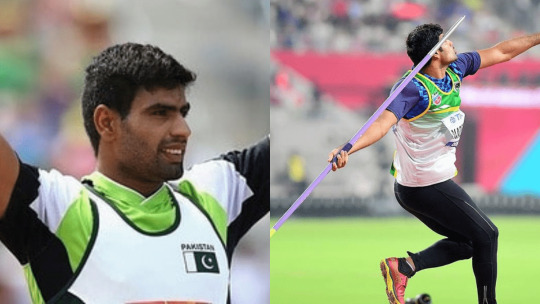
Javelin Athlete Arshad Nadeem will carry Pakistani Flag at Olympics closing ceremony
Pakistan’s star athlete Arshad Nadeem qualified for the final round of the javelin throw. He will carry the Pakistani flag at the closing ceremony of the Tokyo Olympics on August 8.
According to a report, the Pakistan Olympic Association has told management that Arshad Nadeem will be the flag bearer of the Pakistani contingent during the closing ceremony.
“We informed the International Olympic Committee that athlete Arshad Nadeem has designated as the flag bearer of the Pakistani contingent during the closing ceremony,” POA officials said.
Unfortunately Arshad already missed the Olympics opening ceremony due to his late arrival in Tokyo.
At the closing ceremony, it has hoped that the thinnest contingent will be from the participating countries of the Olympics. Because most of athletes have fulfilled their obligations have returned to their respective countries or are on their way home.
Read Also: Umar Akmal allowed to resume club cricket next month
Published in Lahore Herald #lahoreherald #breakingnews #breaking
0 notes
Text
Recovery of Rs115bn from gas consumers okayed
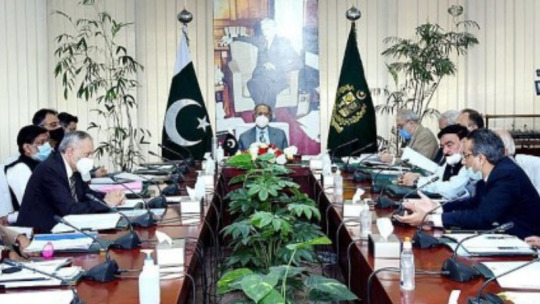
ISLAMABAD: The Economic Coordination Committee (ECC) of the cabinet on Wednesday remained upset over the wheat situation amid vague signals from the authorities concerned and continuously increasing flour prices in the market.
A meeting of the ECC presided over by Adviser to the Prime Minister on Finance and Revenue Dr Hafeez Shaikh, however, allowed recovery of about Rs115 billion through re-gasified liquefied natural gas (RLNG) tariff in a staggered manner to meet the revenue shortfall of Sui Northern Gas Pipelines Limited (SNGPL), including Rs74bn past receivables.
The meeting directed the Oil and Gas Regulatory Authority (Ogra) to issue new CNG (compressed natural gas) licences to RLNG-based CNG stations with the provision that the licensee would neither receive indigenous gas nor can claim for its conversion to indigenous gas. The ban on the issuance of new licences was imposed in 2008.
An ECC participant told Dawn that the committee members expressed serious reservations over the handling of wheat imports, presentation of unauthentic data on demand-supply situation and pricing statistics by the officials of the Ministry of National Food Security and Research (MNFSR) that was causing anxiety among the masses and earning bad name to the government.
ECC allows Ogra to issue new CNG licences; cabinet members assail food ministry over handling of wheat imports, unauthentic demand-supply data and pricing statistics
Informed sources said that those criticising the MNFSR included Dr Shaikh himself, Planning and Development Minister Asad Umar, Adviser to the PM on Commerce Razak Dawood, Power Minister Omar Ayub Khan and Special Assistant to the PM on Petroleum Nadeem Babar. Minister for National Food Security and Research Syed Fakhar Imam also did not support the officials of his ministry.
The ECC members were concerned about the decision-making approach of the MNFSR and asked if the cabinet forum was being taken for a ride. Questions were also raised as to why the import orders of the Trading Corporation of Pakistan (TCP) at $274 per tonne got scrapped and then only a few days later purchases of Russian wheat were being made at $279 per tonne.
The MNFSR reported that the latest TCP tender for 330,000 tonnes opened on Oct 5 had attracted lowest price of $278.5 per tonne for Russian wheat and worked out at Rs49,450 per tonne or Rs1,978 per 40kg. Also, the import of 180,000 tonnes of wheat from Russia on a government-to-government (G2G) basis had been availed at $279 per tonne.
The ministry also reported that Russia had offered 1.17 million tonnes of additional wheat at “highly concessional rates” and demanded that the TCP and Pakistan Agricultural Storage and Services Corporation (Passco) be appointed to procure 750,000 tonnes and 420,000 tonnes, respectively, for supply in January 2021.
A couple of cabinet members asked questions about the ‘highly concessional rates’ for additional quantities but were unable to know the rate per se.
It was highlighted that at the time of cancellation of $274 per tonne tender, the MNFSR had claimed discounted imports from Russia and then disclosed the rate in less than 12 hours of notice before the expiry of the memorandum of understanding with Russia.
One of the senior ministers reported that wheat flour was being sold at Rs1,400 and above per 20kg in the market and figures about wheat availability and supply were unreliable and hence had an impact on the decision-making and reputation of the government.
Dr Shaikh observed that the MNFSR appeared to be setting prices for the market without realising as to what price the commodity would be available and affordable to the common man.
Another minister wanted a detailed explanation about the quality of Russian wheat and if it suited taste of Pakistani consumers.
MNFSR Secretary Omar Hameed Khan reported that Russia was sitting on a stockpile of about 40 million tonnes of surplus wheat, but it appeared unclear what concession was on offer.
A cabinet member said it was reasonably evident that import of about 1.9 million tonnes of wheat — 840,000 tonnes in public sector and about one million tonnes in private sector — had been confirmed until December and hence the stocks were in comfortable position. A review would have to be made next month for future requirements, he added.
The MNFSR secretary did not respond to Dawn request for comment on the wheat situation.
According to an official statement, the ECC constituted a three-member committee comprising the secretaries of finance, commerce and national food security to negotiate the wheat price with the Russian government for further procurement.
The ECC decided that 330,000 tonnes of wheat when imported by the TCP would be distributed equally between Passco, Punjab and Khyber Pakhtunkhwa.
It allowed the recovery by SNGPL of previous revenue shortfall as well as enabling the company to manage the load of domestic/commercial sectors by diversion of RLNG in the approaching winter. The meeting was informed that the outstanding recoverable amount against previous LNG injections into the distribution network for residential and commercial consumers stood at Rs74bn which would increase by Rs40bn to about Rs115bn after upcoming winter months unless a mechanism for recovery was put in place.
RLNG and indigenous gas pricing was ring-fenced but the sale of RLNG had been provided by SNGPL to the domestic and commercial consumers in winter months under political compulsions. The cost difference between the two — local gas and RLNG — had developed an unrecovered expenditure of Rs73.85bn between July 2018 and April 2020 as the expensive LNG (Rs1,450 to Rs1,800 per unit) was provided on the instructions of the government to domestic consumers 91 percent of whom were using gas at the rate of Rs121 per unit.
It was also noted that export sectors, fertiliser and domestic sectors were already on subsidised rates and, therefore, the additional burden would shift to general industry, CNG and power plants where it would translate into electricity tariff.
A cabinet member, however, said the rates for LNG consumers would not increase as it would be offset by cheaper imports at present and some other adjustments.
The ECC directed Ogra to verify the actual quantities of LNG diverted to the domestic consumers and allow a gradual recovery to SNGPL.
Read the full article
0 notes
Text
Latest Urdu News Today
Latest Urdu News
ISLAMABAD: 37 BRIGADIERS OF PAKISTAN ARMY HAVE BEEN PROMOTED TO THE RANK OF MAJOR GENERAL.
Latest Urdu News Today ACCORDING TO PAKISTAN ARMY PUBLIC RELATIONS (ISPR), THE DECISION TO PROMOTE THE BRIGADIERS TO THE RANK OF MAJOR GENERAL WAS TAKEN AT A MEETING OF THE PROMOTION BOARD CHAIRED BY CHIEF OF ARMY STAFF GENERAL QAMAR JAVED BAJWA.
ACCORDING TO A DECISION TAKEN AT A MEETING OF THE PROMOTION BOARD CHAIRED BY ARMY CHIEF GENERAL QAMAR JAVED BAJWA, 12 OFFICERS OF THE MEDICAL CORPS WERE ALSO AMONG THOSE PROMOTED.
ACCORDING TO ISPR, THOSE WHO HAVE BEEN PROMOTED INCLUDE SHEHRYAR PERVEZ BUTT, UMAR MAQBOOL, MOHAMMAD ASIM KHAN,
GHULAM MOHAMMAD, MOHAMMAD NADEEM ASHRAF, AMIR ASHFAQ KAYANI AND MOHAMMAD IMTAN BABAR.
ABDUL SAMI, OMAR AHMAD SHAH, MOHAMMAD SHAHID SIDDIQUE, MOHAMMAD FARHAN YUSUF, AMIRUDDIN, MOHAMMAD IRFAN KHAN, NOOR WALI KHAN, KAMAL ANWAR CHAUDHRY, SALMAN MOIN AND NASEEM ANWAR ARE ALSO AMONG THOSE WHO HAVE BEEN PROMOTED.
Latest Urdu News ACCORDING TO ISPR, MALIK AMIR MOHAMMAD KHAN, ADNAN SARWAR MALIK, MOHAMMAD GADDAFI, MOHAMMAD NAEEM AKHTAR, MOHAMMAD SHEHAB ASLAM, NADEEM YOUSUF, FARRUKH SHEHZAD RAO AND KHURRAM NISAR ARE ALSO AMONG THOSE WHO HAVE BEEN PROMOTED.
IFTIKHAR AHMAD SATTI, SYED ADIL HASNAIN, IRFAN ALI MIRZA, MOHAMMAD RAFIQ ZAFAR, MOHAMMAD WASEEM AND SOHAIL AMIN OF MEDICAL CORPS ARE ALSO AMONG THOSE WHO HAVE BEEN PROMOTED.
Latest Urdu News ACCORDING TO ISPR, NASEER AHMED, EJAZ GHANI, ARSHAD NASEEM AND NADEEM AHMED RANA ARE ALSO AMONG THE PROMOTERS.
ACCORDING TO HUM NEWS, ISPR HAS INFORMED THAT MRS. QAMAR ANSA CHAUDHRY AND MRS. SHAZIA NISAR ARE ALSO AMONG THE PROMOTERS
0 notes
Text
Imran khan requests the resignation of Nadeem Babar as the SAPM on oil
Imran khan requests the resignation of Nadeem Babar as the SAPM on oil
Prime Minister Imran Khan asked to resign the special assistant to the minister of oil, Nadeem Babar.
Planning Minister Assad Umar announced this at a press conference on Friday, where he discussed the results of the Federal Investigative Office in an investigation commissioned by the Prime Minister to determine the cause of the country’s oil shortages.
The Secretary of the Petroleum Department…
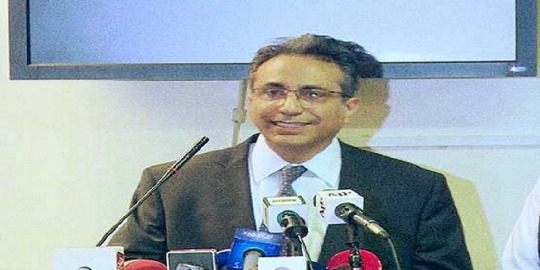
View On WordPress
0 notes
Text
PM directs Special Aide to resign over fuel crisis
PM directs Special Aide to resign over fuel crisis
| Asad Umar says FIA mandated to carry out forensic audit into June 2020 petroleum shortage | Secretary Petroleum will report to Establishment Division | Those found involved will be handcuffed and sent to jail
ISLAMABAD – Prime Minister Imran has directed his special assistant on petroleum Nadeem Babar to step down as the government has decided to carry out the forensic audit of the June…
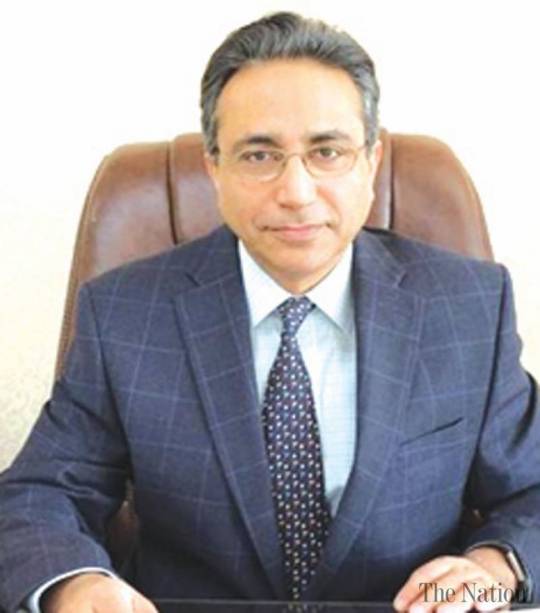
View On WordPress
0 notes